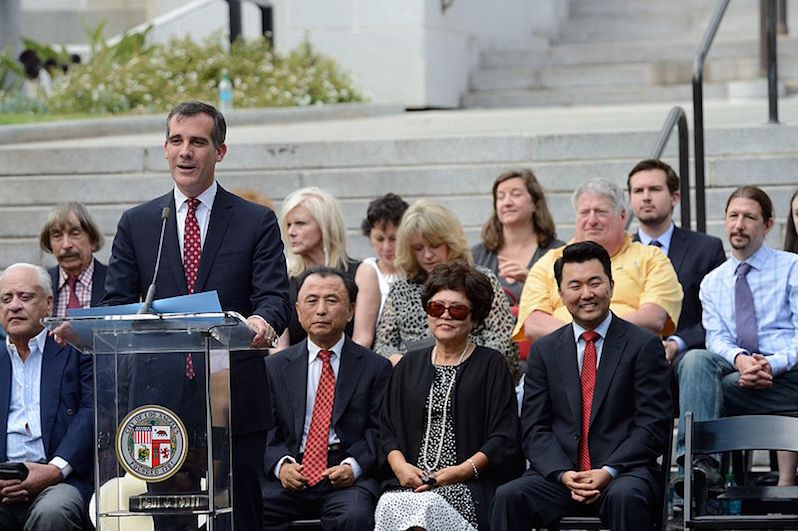The Great American Story of Asian Immigrants and Politics
The rise of Asian-Americans in politics refutes Donald Trump's portrayal of immigrants as an alien body invading the United States. The rise of Asian-Americans in politics refutes Donald Trump's portrayal of immigrants as an alien body invading the United States. Los Angeles City Councilman David Ryu (smiling, facing camera) and Mayor Eric Garcetti (at the podium). (Eric Garcetti) (CC-BY)
1
2
Los Angeles City Councilman David Ryu (smiling, facing camera) and Mayor Eric Garcetti (at the podium). (Eric Garcetti) (CC-BY)
1
2
Younger people like him were long put down by their elders, but no longer.
“We got to speak out,” he said. “We started organizing, registering voters, [believing] we cannot let this happen again. We need access. Connections.”
There were other examples of mistreatment of the Asian-American minority by politicians and law enforcement.
Back in 1871, 17 Chinese were lynched in Los Angeles’ Chinatown in a massacre that historians found was widely supported by the town’s white powers.
All Asian-American immigrants were targeted by the 1913 California Alien Land Law, which had the effect of barring landowning by Chinese, Indian, Japanese and Korean farmers.
Japanese-Americans suffered the worst when, during World War II, President Franklin D. Roosevelt approved imprisoning 110,000 Japanese-Americans in “relocation” camps. Their long fight for reparations and recognition for the injustice was the beginning of Japanese-American political organization.
A governmental and political outrage of another kind spurred the political organization of the largest group of Asian-Americans, the Chinese. It began in the 1980s in Monterey Park, a small suburban city east of Los Angeles with a movement called “English only.” White merchants and politicians tried to ban Chinese-language signs from stores in a city that was becoming home to many Chinese-Americans.
That’s when I met a young member of the small Garvey School District Board, Judy Chu, who taught psychology at East Los Angeles Community College. She and others organized a coalition of Asian-Americans, Latinos and whites against English only. She was elected to the Monterey Park City Council, the state Assembly and then to Congress, where she was the first Chinese-American woman to become a member of the House. She is chair of the Asian Pacific American Caucus. English only, by the way, disappeared when Monterey Park became a majority Asian-American city.
I talked over the history with Mike Woo, dean of the College of Environmental Design at Cal Poly Pomona and the first Asian-American elected to the Los Angeles City Council. He later ran unsuccessfully for mayor.
Woo’s election is part of the history, as is an action he took as a councilman. He was the first member of the council to call for the resignation of the influential police chief Daryl Gates, whose leadership of the department was blamed for police failures to control the 1992 riots and protect residents. The action by the Chinese-American councilman created a bond with African-Americans at a time when their relationship with Asian-Americans had been bad.
Today, more than 4,000 Asian-Americans hold local, state and federal offices. In a paper published by the Center for American Progress in 2014, scholars Karthick Ramakrishnan and Farah Z. Ahmad found that the number of Asian-American voters nearly doubled from more than 2 million in 2000 to almost 4 million in 2012. They are projected to constitute 5 percent of the electorate by 2025 and 10 percent by 2044.
This should be good news for the Democrats in this presidential election year, if they can take advantage of it. Most Asian-Americans favor Democrats and don’t like anti-immigrant politicians. The biggest number of Asian-Americans live in the West, where California, Oregon and Washington are Democratic. But their numbers are increasing in Arizona and, combined with the large number of Latino Arizonans, could deliver that usually Republican state to Hillary Clinton. In Florida a small minority of Asian-Americans, centered in Orlando, could combine with Latinos and take the state away from Trump.
The rise of this immigrant community in politics and its growing participation in the political process are a refutation of Trump and his portrayal of immigrants as an alien body invading the United States.
“The trend toward Democrats by Asians will continue,” Woo told me. “It might be accentuated by what Asians see as anti-immigrant bias.”
In a close election for president, that could make the difference.
Your support matters…
SUPPORT TRUTHDIG
Independent journalism is under threat and overshadowed by heavily funded mainstream media.
You can help level the playing field. Become a member.
Your tax-deductible contribution keeps us digging beneath the headlines to give you thought-provoking, investigative reporting and analysis that unearths what's really happening- without compromise.
Give today to support our courageous, independent journalists.






You need to be a supporter to comment.
There are currently no responses to this article.
Be the first to respond.